- Home
- Alan Bennett
Allelujah!
Allelujah! Read online
ALAN BENNETT
Allelujah!
with an introduction by the author
And thou most kind and gentle death,
Waiting to hush our latest breath.
O praise him! Alleluia!
Contents
Title Page
Epigraph
Acknowledgements
Introduction
Premiere Production
Characters
Allelujah!
Part One
Part Two
About the Author
By the Same Author
Musical Numbers
Copyright
Acknowledgements
Allelujah! has turned out to be a much bigger proposition than I’d imagined when I’d finished writing it. I blithely included a possible choir without indicating how many singers there were or what or where they should sing. My only stipulation was that it shouldn’t include the geriatric Horst Wessel ‘I am h-a-p-p-y’. Nicholas Hytner, to whom after twenty-eight years of working together I am almost routinely indebted, saw more possibilities in the play than I had, seizing on my brief stage directions to make the choir a staple feature of the production and with dance besides. This brought in my friend and long-term collaborator George Fenton who has arranged the music and, in charge of the (to me, wonderful) dancing, Arlene Phillips. The pair of them have coaxed out of the cast music and movement of which they may have thought themselves incapable. I hope they have found the experience enjoyable; neither singer nor dancer myself, I have often envied them. We have had much help and encouragement from our medical advisor Jonathan Sheldon and also from the staff of various hospitals, particularly Leeds General Infirmary, Killingbeck Hospital in Leeds and St Mary’s, Paddington.
In his opening talk to the cast, Nicholas Hytner said, ‘We may not get it right but we will get it real.’ I’d like to thank everyone who has helped in that process.
Introduction
I have been writing plays (slightly to my surprise) for fifty years and more and it is a bit late in the day to confess that I tend to write before I do the research. Otherwise, knowing myself, I’m likely to get too interested not to say bogged down in the facts and so never get round to the play itself.
I first realised this in the 1960s when I was just beginning as a writer, putting together sketches for the Saturday night TV shows that came after That Was the Week that Was. I knew nothing about television and not much more about sketch writing and so made the mistake of over-researching a topic in order to pull out facts that the audience didn’t know. This may have been informative but it wasn’t always funny and I learned early on that in order to interest and amuse an audience one needed to know more than they did but not much more. Ever since I’ve tended to write first and ask questions afterwards. One of the many reasons why I’m happily paired with Nicholas Hytner is that he is of a more literal cast of mind and readily researches the necessary background, querying many of my fanciful notions before putting them to rights. Notably in this play he saw straightaway that in my original draft I was confusing a geriatric ward with a care home and that the difference must be made plain.
I did have some excuse. In theory a geriatric ward is confined to patients who need medical attention because they are ill. They may be ill because they are elderly but age alone does not qualify them for the geriatric ward. It does qualify them for a care home which is for the elderly who don’t require medical attention but do need round-the-clock care. That the difference is not always obvious is because a patient on a geriatric ward who has recovered can’t always be discharged since there is nowhere to dis charge him or her to … no relative willing or able to have them, no vacancy in a care home that would, not to mention the possible expense. So they stay put in the geriatric ward and become bed-blockers and in the process the geriatric ward becomes more like a care home than the hospital would like.
Seldom in hospital myself until I was in my sixties such experience as I’ve had has found its way into the play. When I was first hospitalised as a young man nurses were more likely to be disciplinarians than they are today. Beds were squared off and kept in apple-pie order pending the awed arrival of the consultant with his respectful train of underlings. Nowadays nurses have been robbed of their starch and doctors of their white coats and consultants have been known actually to sit on a patient’s bed, all of them casualties of deference and its decline.
The kindest nurse I ever came across wasn’t a nurse at all. Having been operated on for bowel cancer in 1997 I’d been admitted a few months later to the old Middlesex Hospital off Goodge Street with acute pains in my stomach which were unsurprisingly thought to be a recurrence. Thank fully this proved not to be the case, the culprit an abscess on what remained of my appendix. This had to be drained via a tube introduced through the wall of the stomach. Assuming this would be done under Valium (a drug I’ve always found delightful), I was unworried and indeed the procedure seemed quite casual, taking place in a curtained alcove off quite a busy corridor in the basement. The doctor with a medical student in attendance busied himself with his preparations which included positioning the screen so that he could follow the tube tracing the source of the infection. It was only when I felt a winding blow to my stomach that I realised there was going to be no anaesthetic and not even a painkiller.
As this scalding snake felt its way round my gut I was in agony, though the doctor and the student, both intent on their screen, seemed indifferent to my cries of pain. At this moment a young man came down the corridor, not a doctor certainly and not, I think, a nurse, but just a theatre orderly in hospital greens. Sizing up the situation, unasked he stopped and took my hand. It can only have been a minute or two before the abscess was found and a drain introduced but it was long enough for me to think that this uncalled-for gesture was perhaps the kindest thing anyone had ever done for me. As the drain began to produce pus in gratifying quantities the young man patted my arm and went on his way.
It’s at this point that life connects with art and the story becomes relevant, as afterwards the doctor made the student examine my emaciated stomach to see if he could find the slight pulse which would be an indication of peristalsis, the automatic muscular contractions by which the contents of the alimentary canal are propelled through the body. It’s the procedure which Dr Valentine in the play explains to Colman as a (slightly far-fetched) metaphor for the slow and steady working of the hospital itself. Back on the ward I tried to find out who was my Samaritan but without success, though I was later told that he had become a doctor himself. I hope so.
In one respect the play makes no attempt at realism. Though mitigated these days by the laptop any ward is still dominated by the television screen, chattering away and the background to pain, sorrow and even death. In our hospital I imagine the TV has been banished to a so-called quiet room though in a proper hospital this would probably be unacceptable.
The absence of television is matched by the non-presence of visitors. Though patients on a geriatric ward are more likely to have visitors than the inmates of a care home, a geriatric ward is hardly a magnet for friends and family – friends mostly dead and family getting on with their lives. It’s more likely to be duty than affection that brings company to an old person’s bedside. And once there what to say as one sits by the bed, these wearisome visits less like meetings than periods of sentry duty with the visitor on the look-out for some glimmer of hope or sense. The whole scenario is definitively dealt with in Charles Causley’s poem, ‘Ten Types of Hospital Visitor’, which is quoted in the play.
One of the main characters in the play is Salter, the chairman of the Hospital Trust. He is much in evidence, talking to the nurses, welcoming new arrivals, very much – and perhaps implausibly for a chai
rman – hands on. My doubts about Salter’s over-eager involvement were stilled when the director and the designer, Bob Crowley, visited several hospitals in the interest of authenticity and several nurses reassured them that cameras were always a magnet and, ‘If there’s filming going on, the chairman’s never away.’
Writing a play I have never tried to hide the sound of my own voice. It hasn’t always been where an audience or a critic has thought to find it and certainly not always in the mouth of the leading character. It’s often a divided voice or a dissenting one; two things (at least) are being said and I am not always sure which one I agree with. But that is one reason why I write plays: one can speak with a divided voice. In Allelujah! it means that I have some sympathy with Salter and with Nurse Gilchrist, neither of whom is entirely sympathetic. I subscribe to Chekhov’s dictum that, ‘It is the writer’s business not to accuse and not to prosecute but to champion the guilty once they are condemned and suffer punishment.’
Staged as it is in my eighty-fourth year the play could be taken as a would-be apotheosis though I hope not. It does include occasional jokes that have been with me half my writing life without (perhaps understandably) ever finding a place. Was it at Pontefract Barracks during my basic training in the infantry in 1952 or a few years later in the Ministry of Pensions hospital in Leeds that I heard another soldier make the sauce bottle remark? Now, after sixty years, Joe has it to say. Or I hope he does. That depends if it survives the rehearsals which at the time of writing have not yet started. One of Nicholas Hytner’s skills is as a surgeon, slicing away such inessentials – a cosmetic surgeon perhaps, doing lipectomies but never trespassing into the vitals. There will be cuts and alterations so that the script one ends up with is a bit of a bumpy field, the mounds and hollows reminiscent of a deserted village – Wharram Percy it would be, the famous deserted village in North York shire. With ditches marking the site of lost dialogue and occasional tracks that lead nowhere, for me all my plays have a touch of Wharram Percy.
Plays as I first submit them to Nicholas Hytner are generally quite loose-fitting garments which can then be tailored to his (and sometimes the cast’s) strengths and requirements. Also doing the tailoring in Allelujah! is George Fenton who has arranged the music and whom I’ve known all my working life as he began his career as a young actor in my first play Forty Years On.
I have always thought there is an element of unsought prophecy in plays: write it and it happens. With this play it’s been almost embarrassing. Lest I be thought to be trailing behind the facts I should say that Valentine’s trouble over his visa was written months before the Windrush business. I had originally intended Valentine to be an older doctor, brought out of retirement by the hospital because of shortage of staff. In which case to refuse him a visa would have seemed more shocking, though no more so than the treatment meted out to the long-established immigrants who were so callously singled out.
If not quite a platform, a play is certainly a plinth, a small eminence from which to address the world, hold forth about one’s concerns or the concerns of one’s characters. But not to preach. That is forbidden, though the fact that I always like it when a character steps out of the play and addresses the audience is evidence that I am a thwarted preacher with no other way than this to broadcast my paltry epiphanies. I never like feeling boxed-in by the fourth wall. In this play, though, that problem is to some extent sidestepped as the characters can within the play still address the roving camera, though some more furtively than others. It’s only in the last few minutes that Valentine gets to speak unmediated to the audience, by which time he has earned the right … and maybe that’s why he smiles.
Alan Bennett
May 2018
Allelujah! was first performed at the Bridge Theatre, London, on 11 July 2018. The cast, in alphabetical order, was as follows:
PATIENTS
Molly Jacqueline Chan
Mrs Maudsley Jacqueline Clarke
Mavis Patricia England
Mary Julia Foster
Arthur Colin Haigh
Renee Anna Lindup
Neville Louis Mahoney
Joe Jeff Rawle
Cora Cleo Sylvestre
Lucille Gwen Taylor
Hazel Sue Wallace
Ambrose Simon Williams
STAFF
Dr Valentine Sacha Dhawan
Sister Gilchrist Deborah Findlay
Salter Peter Forbes
Ramesh Manish Gandhi
Gerald Richie Hart
Nurse Pinkney Nicola Hughes
Fletcher Gary Wood
VISITORS
Colin Samuel Barnett
Alex Sam Bond
Mrs Earnshaw Rosie Ede
Cliff Nadine Higgin
Andy David Moorst
Mr Earnshaw Duncan Wisbey
Other parts played by members of the company
Director Nicholas Hytner
Designer Bob Crowley
Choreographer Arlene Phillips
Music George Fenton
Lighting Designer Natasha Chivers
Sound Designer Mike Walker
Assistant Director Sean Linnen
Associate Designer Jaimie Todd
Assistant Choreographer Richard Roe
Music Director Richie Hart
Casting Director Toby Whale
Costume Supervisor Lynette Mauro
Hair, Wigs and Make-up Campbell Young Associates
Props Supervisors Marcus Hall Props
Characters
PATIENTS
Mavis
Lucille
Hazel
Mary
Cora
Mrs Maudsley
Molly
Renee
Neville
Joe
Ambrose
Arthur
STAFF
Salter
Chairman of the Hospital Trust
Dr Valentine
Sister Gilchrist
Nurse Pinkney
Ramesh
a junior doctor
Fletcher
a junior doctor
Gerald
physiotherapist
VISITORS
Colin Colman
Joe’s son, management consultant
Mrs Earnshaw
Mr Earnshaw
Andy
work experience
Alex
documentary director
Cliff
cameraman
Voice
Nurses, Healthcare Assistants, Social Workers etc.
ALLELUJAH!
Part One
A provincial hospital. Stage pretty bare.
MUSIC: ‘Yours’ (Vera Lynn).
An old lady in a wheelchair, very decrepit but with a good voice, sings, accompanied on a cracked hospital piano, as behind her comes up a panorama of a Northern city – Morley, say, or Wakefield.
A doctor at the side of the stage – Asian, thirty-five to forty – observes the old lady, Mrs Maudsley.
Mrs Maudsley It was my house.
Sister Gilchrist now appears, tidies up the old lady and takes her off.
Dr Valentine Those with dementia can sometimes sing even when they cannot talk.
Gilchrist What is there to sing about?
Valentine They can even dance.
Mrs Maudsley It was my house.
Pinkney Dr Valentine. You’re wanted on the ward.
Valentine leaves as a youngish man, aged around thirty – Colin Colman – cycles into view, Lycra-clad and on a posh racing bike. Mobile in ear, he talks and rides without holding the handlebars.
Colin I’m here. Home. Yeah. What?
He consults his wrist.
A hundred and ninety-eight miles.
No, coming up to it now.
In fact, some twat in an ambulance has just cut me up.
I am hi-vis. Lycra from head to toe – you could see me from the fucking moon.
Sorry. It’s just being back.
/>
Oh, much as ever. The town. The hospital. And beyond the hospital, the distant moors.
No, not Muslims, you dick, moors. Heather, gorse. Jesus. No further word from on high? The Minister not minded to make up his mind yet? No?
Anyway, this is a private visit.
My dad, George. My ailing father, patient in the said threatened hospital.
Love? Sure, I’ll give it him, George. Not that he’s ever wanted mine.
Anyway. (About to ring off, he hears singing from the hospital.) Hear that, George? The ancestral anthems of the North.
Colin pauses before cycling off down the hill at the back of the stage.
In the hospital, a line of old people file on, singing ‘Yours’, and sit in a row of armchairs, shepherded by two nurses: Gilchrist and Pinkney. Gerald, the ward physio, is at the keyboards. When not playing for them, he is in constant attendance, working on their mobility. Valentine also present.
A two-person camera crew film them coming on.
The nurses arrange them into position, with Gilchrist occasionally inspecting the skirt of one of the women to check they haven’t wet themselves and feeling the trousers of the men similarly.
Lucille Mr Jessop’s gone.
Hazel Has he?
Lucille Went in the night, the way people do. Mind you, he was very obese.
Pinkney We shall miss him in the choir because he was a bass.
Gilchrist Maybe he was a bass because he was obese.
Pinkney One day, Sister Gilchrist, you’ll learn to take this choir seriously.
Possibly there is a withered balloon somewhere, which Valentine retrieves. Or a streamer reading: ‘Save the Beth’. As the old people settle, the camera is positioned for their interview. Alex is the director, Cliff camera and sound.

 The Uncommon Reader: A Novella
The Uncommon Reader: A Novella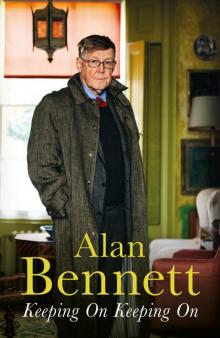 Keeping On Keeping On
Keeping On Keeping On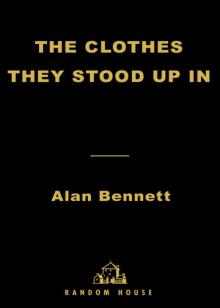 The Clothes They Stood Up In
The Clothes They Stood Up In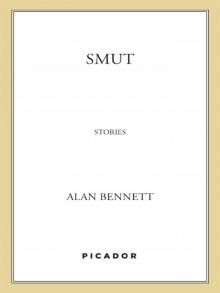 Smut: Stories
Smut: Stories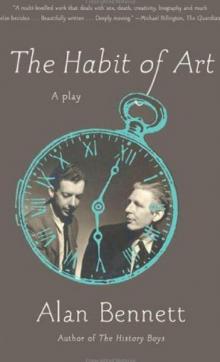 The Habit of Art: A Play
The Habit of Art: A Play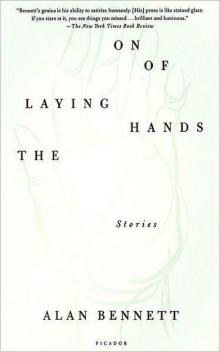 The Laying on of Hands: Stories
The Laying on of Hands: Stories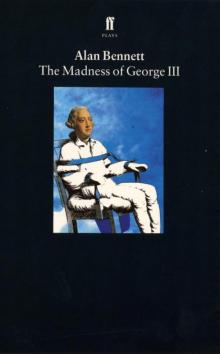 The Madness of George III
The Madness of George III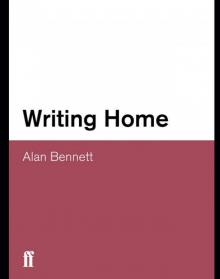 Writing Home
Writing Home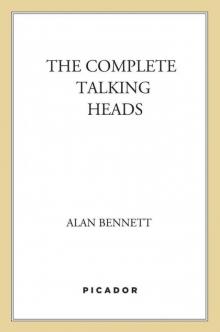 The Complete Talking Heads
The Complete Talking Heads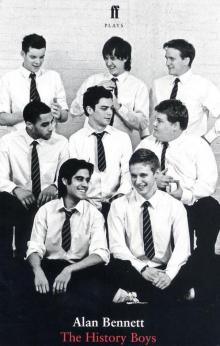 The History Boys
The History Boys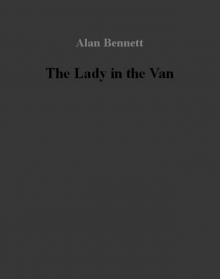 Lady in the Van
Lady in the Van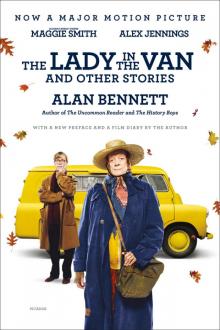 The Lady in the Van
The Lady in the Van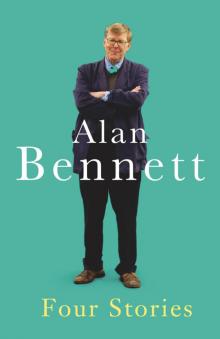 Four Stories
Four Stories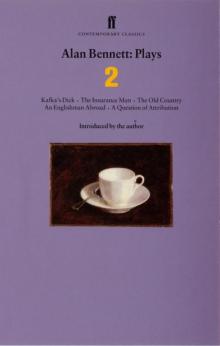 Alan Bennett: Plays, Volume 2
Alan Bennett: Plays, Volume 2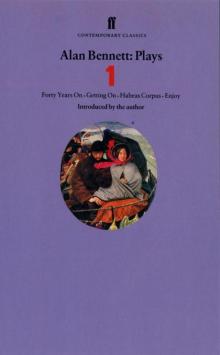 Alan Bennett: Plays, Volume 1
Alan Bennett: Plays, Volume 1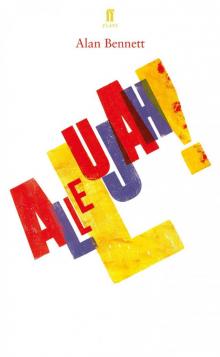 Allelujah!
Allelujah!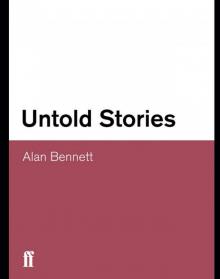 Untold Stories
Untold Stories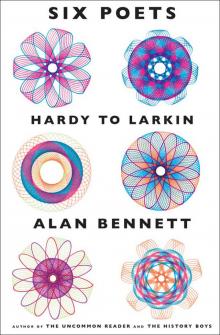 Six Poets
Six Poets